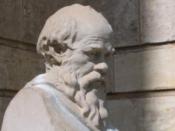Despite the fury of Juan, philosophy has survived! Many of you expressed that the handout concerning Nagel, Smart, and Russell was helpful, so I have endeavored to take you on a similar journey through our more recent authors as well. Again I should stress that philosophers write primarily for other philosophers. As a result, philosophy articles are sprinkled with jargon and references to hard issues.
Apology: A Defence of Socrates, by Plato.
Plato is Socrates' student and perhaps the greatest philosopher of all time. He employed the voice of Socrates in his dialogues, which are often written in the form of little plays or narrated speeches. In this particular one, Plato tells the story of the trial of Socrates by recounting Socrates' speeches in his own defence. It is impossible to tell where Socrates' ideas end and Plato's begin.
The Socratic Method:
Socrates is famous for a number of things, not least of which is his method of doing philosophy.
Socrates employed a method known as dialectic. Dialectic, or the Socratic Method, is a question and answer styled conversation in which the 'expert' is examined by a questioner who feigns ignorance. This feigned ignorance is sometimes known as 'Socratic Irony'. The questions are designed to lead the 'expert' into contradictory statements, revealing the fact that the 'expert' is no expert at all. Often the questioner does not attempt to solve the issue, the point is rather to prove that the 'expert' doesn't know what he/she is talking about. You should try the Socratic Method on your friends, they will love it!
The main points:
There is a lot going on in the Apology, so you would do well to stick to the main points of Socrates' defence:
1)(p. 28) Socrates identifies two sets of accusers. Socrates had quite...



Fantastic
this was very nicely written and it helped me very much with my paper. the points and arguments were well presented and there was a nice flow between paragraphs. thank you so much for posting, really helped me study and understand and present my points.
0 out of 0 people found this comment useful.